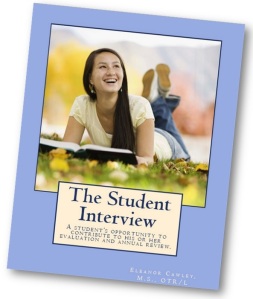That’s right! Annual review season will be here in just a few months. You should start writing your annual reviews shortly. During annual review, it is prudent to get a student’s feedback on what is working and what is not working. Make sure that you have a way to gain that additional information. An interview is always helpful to provide insight on a student’s ability to function not only in the classroom but also at home. Parents so often paint a different picture of a student’s abilities at home. Students can behave differently at home.
This is the time to put all your ‘ducks in a row.’ When assessing your students, make sure to have a balanced assessment with some type of real-life [authentic] assessment. This often means having a rubric to demonstrate how a student’s progress has been judged and the data that supports the student’s progress.
Think about interviewing your student to learn about his or her insights into their skills. Did you ever think about providing your student with a satisfaction survey? This is quite eye opening. By developing a rapport with your students, you have the opportunity to create a report that is quite inclusive of all their skills and their opinions. Listening to and including your student’s opinions leads to better goal development, better outcomes and improved compliance with recommended strategies.
Engage your students in every way possible to participate in collecting data and the development of their IEP. You will go a long way in developing the respect and the trust of your students.
Related articles
- The Student Interview (eleanorot.wordpress.com)
- Writing Math IEP Goals (specialeducation.answers.com)
- Special Education /Disability Law Vocabulary: How can anyone be expected to understand all of this?! (atlantaattorneywhomakeshousecalls.wordpress.com)


You must be logged in to post a comment.